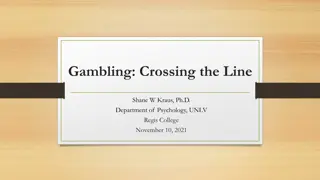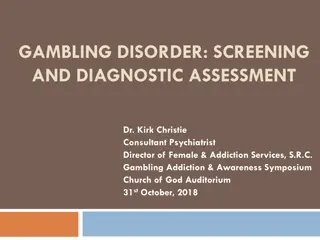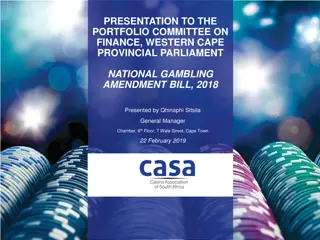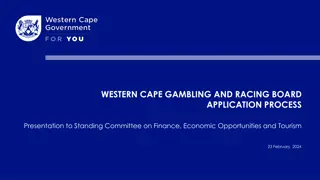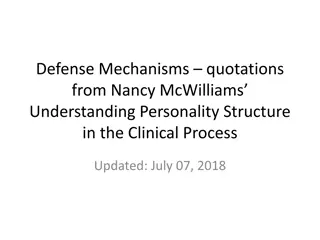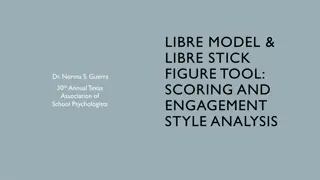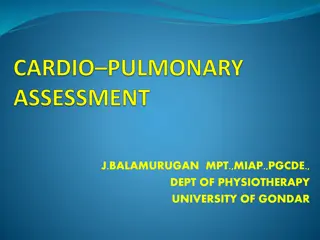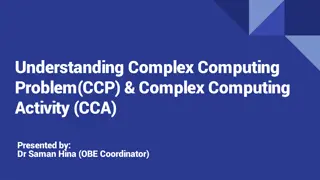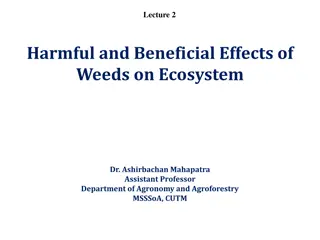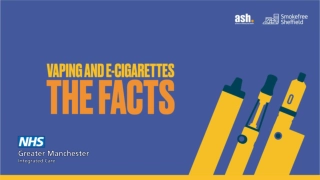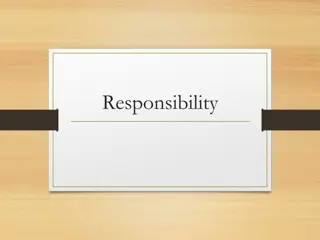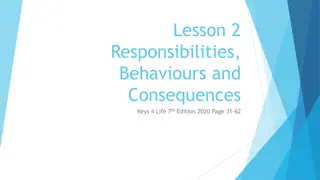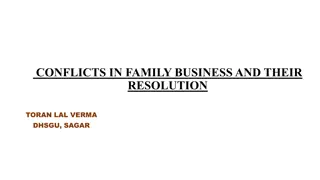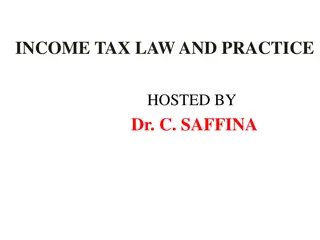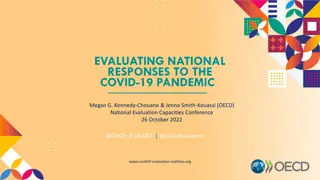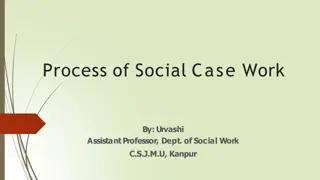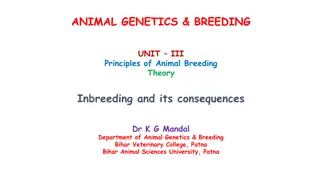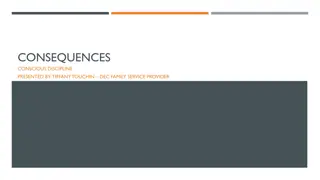Impact of Problem Gambling on Family Psyche: Understanding the Consequences
Gambling problems can have severe repercussions on individuals and their families, leading to financial and emotional distress. This presentation explores the reasons why people gamble, the effects on families, and the gender perspectives on gambling addiction. The negative impact on family psyche is profound, with addiction leading to stress, anxiety, and financial strains. Recognizing and addressing this issue is crucial for supporting affected families and individuals.
Download Presentation

Please find below an Image/Link to download the presentation.
The content on the website is provided AS IS for your information and personal use only. It may not be sold, licensed, or shared on other websites without obtaining consent from the author. Download presentation by click this link. If you encounter any issues during the download, it is possible that the publisher has removed the file from their server.
E N D
Presentation Transcript
IMPACT OF PROBLEM GAMBLING ON FAMILY PSYCHE Presentation by: Noxolo Adonis & Alpheus Matlala
TABLE OF CONTENT TABLE OF CONTENT 1. Introduction 2. Reasons why people Gamble (A Gender Perspective on Gambling) 3. Effects of Gambling in Families 3.1 The Different Type of Effects of Problem Gambling on Families 4. Conclusion
1. Introduction 1. Introduction A gambling problem is defined as difficulties in limiting money and/or time spent on gambling which leads to adverse consequences for the gambler, for others or the community. It is characterized as a psychiatric problem as it develops dysfunctional and extreme behaviors. It has negative implications for wellbeing and can lead to cognitive and personality changes and can consequently compromise physical health; causing anxiety, depression and other physical illnesses including cardiovascular disorders and hypertension. Gambling addiction is categorized as a social abnormality and There is a direct relationship between behavior and wider psychosocial implications. The systematic behaviors of gambling can stem from childhood maltreatment, including physical, emotional and sexual abuse.
Cont. Introduction Cont. Introduction While it is difficult for many to understand, addicts typically live everyday caught in a downward spiral. Their anxiety about their inability to control the problem behavior and its consequences causes stress. When a punter is stressed, he/she would want to chase his/her losses , in the long run this could lead to addiction. When a gambler is now addicted his behavior becomes a problem to his immediate family and people around him/her, including the community.
2. Reasons Why People Gamble 2. Reasons Why People Gamble There are several motives that enslave an individual to gamble, including stimulating the mind into escape, winning, coping, excitement, social interactions, exploration, financial gains and boredom alleviation. Both males and females have differentiated emotional factors relating to their motive on gambling, but it is not so transparent what the prominent emotional factors are. What is known is that males are more likely to gamble and are, theoretically, at a higher risk of long-term problems. According to a study by Hing et.al (2020) female partners of problem gamblers reported that men became consumed by their gambling and usually spent all available funds every time they gambled, including the family s income, savings, lump sum payments and loans.
Cont. Reasons why People Gamble (Female Perspective) Cont. Reasons why People Gamble (Female Perspective) The vast majority of women reported that their partners were abusive and controlling before the commencement or escalation of his gambling problem, reflecting gendered attitudes that underpin men s violence against women. Many women reflected back on early warning signs of their partner s domineering, manipulative, disrespectful and narcissistic tendencies that were then exacerbated by his gambling problem. Many women reported resistance from their partner s family and friends if they criticized his gambling, as gambling was viewed as a normal male activity. These norms drive the social acceptance of heavy gambling and contribute to the related Intimate Partner Violence. Gambling to cope with or escape from negative mood states elevates the risk of problem gambling. Women have a greater tendency to gamble to escape from stress, boredom and loneliness, while men are more likely to gamble to win money, outperform others or test their skill.
Cont. Reasons why People Gamble (Male Perspective) Cont. Reasons why People Gamble (Male Perspective) The study conducted by Hing et.al (2020) further indicated that men who participated in the study reported that Male perpetrators repeatedly intensified both their violence and gambling over time. This pattern of abuse often commenced with anger and arguments over gambling and the financial stress that gambling was causing, followed by increased verbal and emotional abuse. As the perpetrator s gambling problem became more severe and his desperation for money for gambling increased, physical and sexual violence could also become more frequent and severe. Social norms around gambling: Heavy gambling was reportedly embedded into family and peer subcultures for many men with gambling problems. Gambling venues were places where men could find peer encouragement to subordinate women and gamble heavily.
3. Effects of Gambling in Families 3. Effects of Gambling in Families According to a study by the National Gambling Board (2013), problem gambling has an impact on the family and particularly wives, female partners, and children. Gambling problems can have severe personal consequences, including financial hardship, emotional difficulties, social impacts, employment loss of personal property, loss of expenditure, aggravation in the household /intimate partner violence, lies and deception, neglecting family responsibilities and relationship issues (leading to separation and divorce). They can also have significant impacts on families. According to a study by Dowling conducted in 2014, it has been estimated that the gambling problem of one Australian negatively affects at least seven other people. The study further stated that the effects of problem gambling on the family are multifaceted and detrimental. There are robust finding that parental involvement in gambling is associated with an increased in the prevalence of gambling-related problems in adolescent.
3.1 Types of Effects of Problem Gambling in Families 3.1 Types of Effects of Problem Gambling in Families 1. Intimate Partner Violence (Household Aggravation) 2. Neglecting Family Responsibilities & Relationship Issues 3. Negative Impact on Children 4. The loss of household, personal property or money 5. Lies & Deception
3.1.1 Intimate Partner Violence (Household Aggravation) 3.1.1 Intimate Partner Violence (Household Aggravation) According to a study by Dowling (2014) there is consistent evidence of an association between gambling problems and family violence. The relationships are complex; however, people with gambling problems are more likely than people without gambling problems to be victims and perpetrators of IPV. Dowling further indicated that, over one-third of people with gambling problems report being the victims of physical IPV (38%) or the perpetrators of IPV (37%). Moreover, 11% of offenders of IPV report having gambling problems. The intimate relationships of people with gambling problems involves poor communication, relationship and sexual dissatisfaction, conflict and arguments, and consideration of separation or divorce.
Cont.. Cont. . The effects of gambling problems on intimate relationships have been divided into three distinct phases: i. The denial phase. ii. The stress phase. iii. The exhaustion phase. The Denial Phase include: Occasional worries, making excuses for gambling, Accepting remorse of gambler, there are unexplained financial crisis, hopelessness and helplessness.
Cont. Intimate Partner Violence Cont. Intimate Partner Violence The Stress Phase include: Gambler spends less time with the family, arguments, spouse feels rejected, demands upon gambler, attempts to control gambling, provides bail outs; avoids children, family and friends, isolation and intense resentment.
CONT CONT The Exhaustion phase include: Impaired thinking, - when a person has trouble remembering, concentrating, or making decisions that affects their daily life confusion physical symptoms (this may include sleep problems, headaches), rage, Anxiety and pain.
3.1.2 Neglecting Family Responsibilities & Relationship 3.1.2 Neglecting Family Responsibilities & Relationship Issues Issues Gambling Problem impairs family relationships. The family environments of people with gambling problems are characterized by high levels of anger and conflict, as well as low levels of clear and effective communication, less engagement in intellectual and cultural activities, a lack of commitment and support, little direct expression of feelings, and less participation in social and recreational activities. Spouses of problem gamblers often resort to divorce due to communication difficulties, poor conflict resolution and an unsatisfactory sexual relationship with their partners.
3.1.3 Negative Impact on Children 3.1.3 Negative Impact on Children Many families suffer psychological disruption than do problem gamblers themselves, which may lead to a very dysfunctional family environment. Problem gambling contributes to numerous relationship stressors due to financial pressures, prioritization of gambling over the family, and disruption to family functioning. The children of people with gambling problems are exposed to a range of family stressors, including financial and emotional deprivation, physical isolation, inconsistent discipline, parental neglect/abuse and rejection, poor role modelling, family conflict, and reduced security and stability.
Cont... Cont... The children of problem gambling parents are also at risk of developing gambling problems themselves. The study by Dowling (2014) revealed that people who had a parent or sibling with a gambling problem were 2 to 10 times more likely to experience gambling problems than people without a parent or sibling with a gambling problem.
3.1.4 3.1.4 The loss of household, personal property or money The loss of household, personal property or money Economic/Financial abuse can have serious and long-lasting impacts. According to a study conducted by Hing et al. (2020), men with a gambling problem usually exercise control over the family s finances and subjected their female partner to economic abuse as the gambling losses escalated. Victims can be coerced into financial dependence on the perpetrator, and experience stress from deprivation and exploitation, which can delay o prevent them from leaving the abusive relationship. The study further revealed that most women reported that the resulting poverty trapped them in the relationship, extending their victimization, with the abuse intensifying as the gambling problem worsened.
Cont.. Cont. . Those who left their relationship were typically destitute and in debt, with little prospect of ever recovering financially. Women victims are often financially deprived from the economic abuse by their male partner and reported needing immediate practical, financial and accommodation support for themselves and their children.
3.1.5 Lies & Deception 3.1.5 Lies & Deception Gambling Disorder (GD) is a psychiatric condition and it is characterized by a maladaptive pattern of gambling behavior that persists despite negative consequences in major areas of life functioning. One of the symptoms that portray GD is the lies to conceal the extent of involvement with gambling. More often gamblers lie about their finances and are not transparent with their financial issues(to their partners). Sometimes addicts remain stuck in denial, unable to admit the true depth and breadth of their problem to anyone, even those they love.
CONCLUSION CONCLUSION The presentation above shows evidence that Problem gambling does not only affect the individual through changes in their behaviour but has adverse consequences on other people; through aggravation in the household /intimate partner violence, lies and deception, neglecting family responsibilities and relationship issues.


